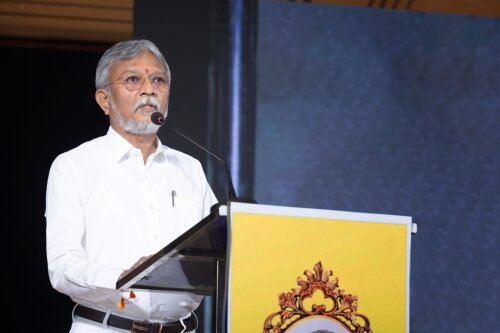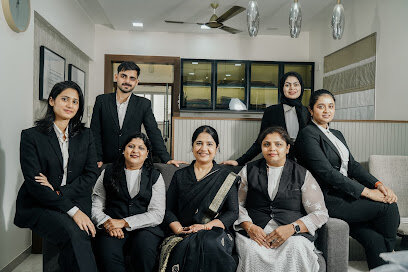Best Collaborative Law Lawyers in India
Share your needs with us, get contacted by law firms.
Free. Takes 2 min.
Free Guide to Hiring a Family Lawyer
Or refine your search by selecting a city:
List of the best lawyers in India
About Collaborative Law in India
Collaborative Law is a voluntary dispute resolution process where parties commit to resolving their issues without going to court. In India, this method is gradually gaining recognition, especially in family law matters such as divorce, child custody, and other personal affairs. The goal is to reach a mutually beneficial agreement with the help of trained collaborative lawyers. This approach emphasizes face-to-face negotiations and encourages open communication, aiming for amicable settlements. Collaborative Law is seen as a less adversarial alternative to traditional litigation, offering a relatively private and personalized means of addressing conflicts.
Why You May Need a Lawyer
If you are involved in a family dispute or business conflict that you prefer to resolve amicably, a collaborative lawyer may be beneficial. Common situations where collaborative legal assistance might be needed include:
- Divorce settlements where both parties wish to maintain cordial relations post-divorce.
- Child custody arrangements requiring flexible and cooperative solutions.
- Business disputes where maintaining professional relationships is crucial.
- Complex estate planning where interests of multiple family members need to be aligned.
A lawyer specialized in collaborative law can help facilitate discussions, guide negotiations, and draft agreements that meet the needs of all parties involved.
Local Laws Overview
Collaborative Law in India is influenced by several legislative frameworks, though it lacks specific statutory recognition. Key aspects include:
- The Family Courts Act, 1984 provides a legal framework for settlement of family matters, encouraging reconciliation.
- The Indian Contract Act, 1872 governs agreements made during collaborative processes.
- ADR Mechanisms such as mediation and arbitration also support the principles of Collaborative Law.
- Recent moves towards recognizing Alternative Dispute Resolution (ADR) highlight the country's growing acceptance of collaborative methods.
While the legal structure in India supports collaborative efforts in principle, practitioners often adhere to guidelines used internationally until formal local regulations are enacted.
Frequently Asked Questions
What is the main benefit of Collaborative Law?
The primary benefit is the potential for more amicable settlements that preserve relationships and offer tailored solutions specific to the parties' needs.
Is Collaborative Law legally binding in India?
Yes, agreements reached through the collaborative process can be legally binding if properly documented and all parties consent.
How does Collaborative Law differ from mediation?
In Collaborative Law, each party has their own lawyer to provide advice, while in mediation, a neutral mediator assists both parties without giving legal advice.
Who can participate in the Collaborative Law process?
It involves parties in dispute, their respective collaborative lawyers, and if needed, experts such as financial advisors or child specialists.
Do both parties need to agree to a Collaborative Law process?
Yes, the process is voluntary, requiring the agreement and cooperation of all parties involved.
What happens if there's no resolution through Collaborative Law?
If parties cannot reach an agreement, they may resort to court, but must engage new legal representation as collaborative lawyers cannot represent them in litigation.
Are Collaborative Law proceedings confidential?
Yes, discussions and documents used during the process are typically confidential, ensuring privacy for all involved.
How long does a typical Collaborative Law process take?
Duration varies depending on the complexity of the issues, but it often resolves matters faster than traditional court proceedings.
What type of legal disputes are suitable for Collaborative Law?
While popular for family and matrimonial issues, it's also applicable to business disputes, contract disagreements, and estate matters.
How do I find a collaborative lawyer in India?
Look for practitioners who are trained in collaborative law approaches, often listed through professional ADR organizations or family law networks.
Additional Resources
Consider reaching out to the following for more information or assistance:
- Indian Council of Arbitration (ICA): Offers resources and support on ADR processes.
- State Legal Services Authorities: Provides guidance and sometimes low-cost legal assistance in collaborative processes.
- International Academy of Collaborative Professionals (IACP): Offers resources and directories of trained collaborative professionals globally.
Next Steps
If you are considering Collaborative Law as a solution to your legal issue, here are some recommended steps:
- Identify and select a trained collaborative lawyer in your area.
- Discuss your case with them and explore whether this process suits your needs.
- Engage with the other party to gauge their interest and willingness to participate.
- Formally agree to the collaborative approach by signing a participation agreement.
- Collaboratively work with professionals to reach a resolution and finalize agreements.
Collaborative Law offers a valuable avenue for resolving disputes while preserving relationships and ensuring personalized outcomes. With the right guidance, it can be an effective alternative to traditional litigation.
Lawzana helps you find the best lawyers and law firms in India through a curated and pre-screened list of qualified legal professionals. Our platform offers rankings and detailed profiles of attorneys and law firms, allowing you to compare based on practice areas, including Collaborative Law, experience, and client feedback.
Each profile includes a description of the firm's areas of practice, client reviews, team members and partners, year of establishment, spoken languages, office locations, contact information, social media presence, and any published articles or resources. Most firms on our platform speak English and are experienced in both local and international legal matters.
Get a quote from top-rated law firms in India — quickly, securely, and without unnecessary hassle.
Disclaimer:
The information provided on this page is for general informational purposes only and does not constitute legal advice. While we strive to ensure the accuracy and relevance of the content, legal information may change over time, and interpretations of the law can vary. You should always consult with a qualified legal professional for advice specific to your situation.
We disclaim all liability for actions taken or not taken based on the content of this page. If you believe any information is incorrect or outdated, please contact us, and we will review and update it where appropriate.
Browse collaborative law law firms by city in India
Refine your search by selecting a city.














